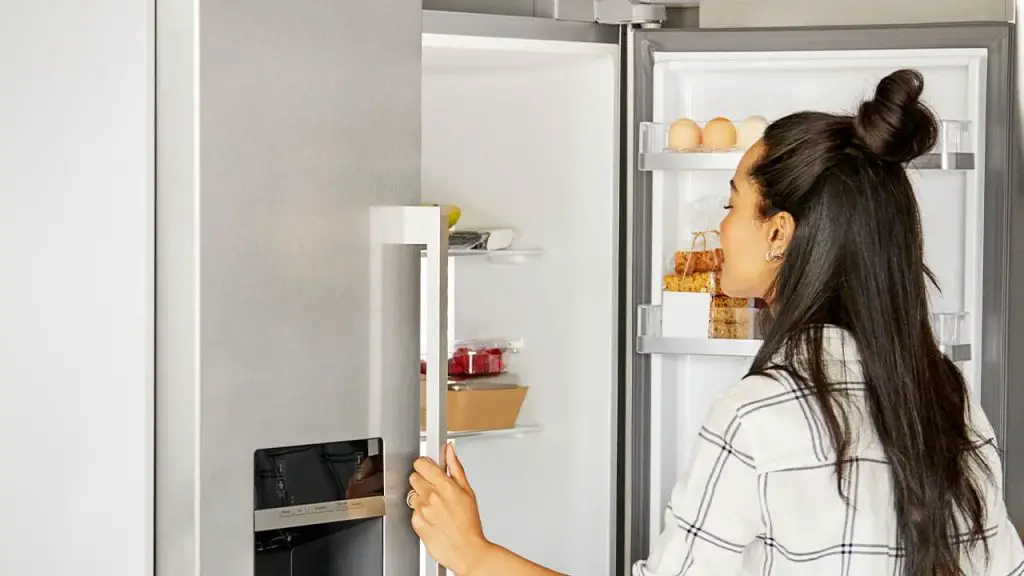It’s no secret that freezers use a lot of power – but how many watts does a freezer use exactly? And what can you do to reduce the number of watts your freezer consumes?
In this comprehensive guide, we will answer all of your questions about freezer power consumption.
We’ll take a look at how many watts different types of freezers use, and offer tips on how to reduce power usage.
Plus, we’ll discuss how to run your refrigerator using a generator – so you can keep your food cold even during a power outage.
The required wattage of a freezer depends on the size and construction material. Freezer wattage is generally between 80 and 900 Watts. Modern freezers have a wattage that is typically less than 310 Watts.
Standard-sized upright freezers and chest freezers, as well as deep freezers, fall within this wattage range. There are exceptions to this wattage range, but they are far less prevalent.

Types of Freezers and Their Respective Wattages
There are various types of freezers and power consumption is different in them. So, let’s take a look at them.
Upright Freezer
Stands-up freezers, also known as upright freezers, are types of refrigerators with a greater height than width. They have a design similar to that of a regular refrigerator.
Upright freezers feature several levels of shelves within and a front-mounted door for access. When compared to deep and chest freezers, upright freezers offer more organization and easier access to products.
Upright freezers consume 50.86 watts on average, according to an analysis. The most frequent wattage for upright refrigerators is 44.98W. Upright refrigerators use between 28.2W and 74.09W, on average, throughout the day in modern models.
Chest Freezer
A chest freezer is a type of freezer that has a top-mounted door. Freezers with a top-loading design are generally used for longer-term storage because organization and access are more challenging.
Compact chest freezers, which are smaller than standard chest freezers, are also available. A deep freezer is a type of chest freezer. Although not all compact chest freezers are deep freezers, they may be classified as such.
On average, chest freezers consume roughly 27.85W of power. This is somewhat more than the usual number of watts utilized by chest freezers, which is 22.95W. Throughout the day, chest freezers use between 22.95 and 39.5W on average.
Deep Freezer
Deep freezers are chest, upright, or any sort of freezer with a depth greater than usual. In contrast to the deep freezer’s size, deep freeze refers to the freezer’s depth rather than temperature.
A refrigerator freezer is a deep freezer if you need to dig far into the freezer to remove or store items. The terms “deep freezer” and “chest freezer” are sometimes used interchangeably.
When referring to a chest freezer, the term deep freezer is most often used. It’s somewhat less frequently employed to refer to big upright freezers.
Deep freezers, on average, consume 24.91W of power. Deep freezers use a range of 19.63W to 39.5W, with 22.37W being the most frequent.
Compact Freezer
Compact freezers are those that are chest, upright, or have any other form of freezer smaller than their normal-sized counterparts. Compact freezers have volumes ranging from 1.1 ft3 to 7.2 ft3, depending on the Energy Star-certified small freezer sizes.
Let’s go back to the electricity consumption figures and see how many watts various freezers use now that we’re on the same page.
Compact freezers use, on average, 26.74 watts. The most frequent wattage of a compact freezer is 27.4 watts. Compact freezers consume between 15.64 and 45.55 watts each day, on average
Tips on Reducing Power Consumption
If you’re concerned about how much power your freezer uses, there are a few things you can do to reduce it. They’re simple to do, and they don’t require any special skills or knowledge.
Picking the ideal site for your freezer, cleaning your freezer, maintaining an appropriate temperature for your freezer, and defrosting it are all part of this process.
- Location: The ideal location for your freezer is the coldest area in your home. It should be kept away from sources of heat, such as direct sunshine or an oven.
- Cleaning the Freezer: By frequently, this implies that your freezer must be cleaned at least once every three months. Cleaning the outside of your freezer is also important. Wipe the border and clean the dusty coils as well. By then, a layer of dust will have accumulated under it if you look beneath it.
- Setting Optimal Temperature: The ideal temperature for a freezer is -18°C (or -0.4°F), which is about the coldest it can be without damaging your food. If you raise the temperature by one Celsius unit, your energy usage will go up by 5 to 10%.
- Defrosting: This is to avoid forming ice in the freezer. Ice can consume 10% more power if it builds up in your freezer. An ice buildup will also make it more difficult for your freezer to operate effectively and appropriately.
- Ventilation: When your insulation is obstructing the airflow in your home, it can cause parts of your home to overheat and break down. It’s also possible that this will prevent future breakdowns and overheating. Overheating can cause greater energy use, so don’t block air vents or place your freezer too close to the wall.
Running Refrigerator Using a Generator
You may be considering a generator to power your refrigerator if you live in an area where outages are common or if you’ve lost electricity as a result of a storm.
But first, there’s some information you need to know about generators.
What size generator do I need to run a refrigerator?
To begin, you must first determine the watts consumed by your refrigerator. To get your generator up and running, it will require more power to start than it will operate.
For example, a 750-watt fridge may have a startup wattage of 1,200 watts. In this situation, a 1500-watt generator would be sufficient enough to run your refrigerator. Confirm the starting wattage in your manufacturer’s handbook.
Some questions might be on the way. Let’s answer them quickly.
Is it possible for a 2,000-watt generator to keep a refrigerator cool? A 2,000-watt generator should be able to power the majority of home refrigerators based on the wattage.
Before using the generator, check your fridge’s wattage and starting wattage to avoid inadvertently overloading it.
Is it possible for a generator to harm a refrigerator? It’s feasible for a generator to harm a refrigerator, although it is not always the case.
If your generator is too little to handle the starting wattage, your fridge could overheat.
Optimizing Power Consumption
By taking a few simple actions, you can save money on your energy bill and lower the amount of power your refrigerator consumes. Here are some suggestions for reducing the amount of energy consumed by your refrigerator.
- Keep the Door Closed: When it comes to deciding what you want for a snack, do your best to avoid staring longingly into the refrigerator. Leaving the door open allows cool air out and warm air in, which makes things difficult for the fridge to balance the optimal temperature.
- Clean the Coils: It’s typical for the condenser coils to become clogged and collect dust and hair. When this happens, the condenser has to work harder, using more energy and possibly forcing you to pay for costly maintenance.
- Cooler Location: If you put your refrigerator in a location where it is exposed to heat or sunlight, it must work against the elements to keep the contents cold, which consumes valuable energy.
- Energy Star-Certified Refrigerator: Modern, Energy Star-certified refrigerators operate more effectively and consume less power than previous versions. A new refrigerator may help you save money on your energy bill.
Conclusion
With this article, we learned “how many watts does a freezer use?”. Also, how you can reduce the power consumption of your freezer by taking some simple actions. Additionally, we learned how to run a refrigerator using a generator in case of a power outage.
And finally, how to optimize power usage by selecting the right location for your refrigerator. Furthermore, we took a moment to understand various types of freezers and their respective wattages.
FAQs
Do freezers use a lot of electricity?
No, freezers don’t use a lot of electricity. In fact, freezers are usually one of the most efficient appliances in your home. The average power consumption of a freezer is between 50 and 150 watts.
Will a solar generator power a freezer?
A solar generator can power a freezer, but how much power it can provide depends on the size of the freezer and how much sunlight is available. A typical solar panel produces about 30 watts of power, so you would need at least two panels to run a small chest freezer.
How to optimize the power usage of a freezer?
There are a few things you can do to optimize the power usage of your freezer, such as:
– Keep the door closed as much as possible.
– Clean the coils regularly.
– Place the freezer in a cool, shady spot.
– Choose an energy-efficient model.
Additional Contents


